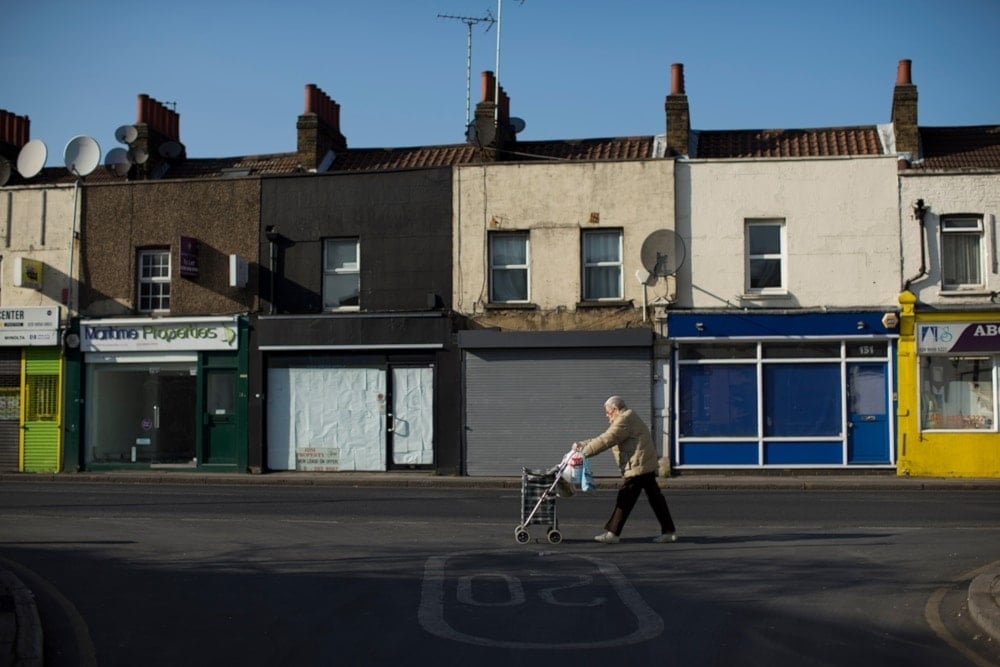Private landlords and hotels ‘cashing in’ on England’s homelessness
UK councils are paying significantly above market rates for temporary accommodation, trapping thousands of families in unsafe, overcrowded housing.
-

An elderly lady walks with a wheelie shopping bag past four closed shops on Trafalgar Road in Greenwich, London, Tuesday, March 5, 2013. (AP)
An investigation reported by The Guardian has revealed that private landlords and hotel owners in the United Kingdom are charging government councils significantly more than standard rental prices in other private sectors to accommodate people at risk of homelessness, a hidden crisis in the UK.
Local councils are paying up to 60% above market rates for rooms in bed & breakfasts and hostels, and in many cases, even double what similar private rentals would cost in the same area.
Experts warn that a loosely regulated £2 billion temporary housing sector has developed, with some providers offering unsafe, unsanitary conditions, according to accounts from those affected.
“Temporary accommodation is the shame of our society – families are stuck for months, even years, in often overcrowded, appalling conditions, and shunted from place to place with little to no notice,” said Mairi MacRae, the director of campaigns and policy at Shelter.
Temporary accommodation is intended as a short-term measure while councils determine eligibility for social housing and arrange permanent homes, but rising rents, reduced housing benefits, and a shrinking supply of social housing have forced many into long-term stays. With limited housing stock, councils often rely on bedsits, private rentals, B&Bs, and hotels.
In 2023, English councils spent over £2.1 billion on temporary accommodation, a third increase from the previous year, while London boroughs alone spent £4 million a day, accounting for three-quarters of their total housing budgets.
“It is nothing short of outrageous that private providers have been cashing in on this crisis, but without enough homes for social rent, councils have little choice but to pay these eye-watering sums so families don’t end up on the streets.”
Dire living conditions
Currently, over 100,000 households in England are living in temporary accommodation, making the UK the developed nation with the highest rate of homelessness. Temporary accommodation in England now houses a record 164,000 children, with nearly 17,000 families stuck there for over five years.
Adding to the tragedy, the Shared Health Foundation found that temporary accommodation had contributed to the deaths of at least 74 children between 2019-2024 (58 of whom are under the age of one), with the National Child Mortality Database quoting 80 children as of January 2025.
New data from @NCMD_England: 80 children have died while living in temporary accommodation in one year
— Households in Temporary Accommodation APPG (@TA_APPG) January 28, 2025
Between 2019-2024, 74 children have died with TA as a contributing factor to their death. 58 were under 1 year old.
Read the full report: https://t.co/MX2hPSf4lr@Siobhain_Mc pic.twitter.com/EQvOl4QNA4
Several people who have lived in temporary accommodation recently shared their experiences with The Guardian, describing the strain of raising families in spaces unsuitable for extended stays. One woman, Aimee, said she was housed in a filthy, rodent-infested hotel, in conditions so poor that her children chose to live with their grandmother instead.
“I was only supposed to be there for 50 days but I ended up there for two years, mostly without my children,” she said. “I got told that housing would be found for me within four weeks of my being there, and it still hasn’t over two years later.”
Councils struggle with costly, inadequate temporary housing
As councils spend billions on emergency housing, a profitable but poorly regulated industry has emerged, with limited oversight by councils due to stretched resources. A Guardian investigation using council data revealed that temporary housing is now consuming over 20% of some councils' core budgets, with Hastings (a seaside town and borough in East Sussex) spending more than 50%.
The council recently explained to MPs on the housing and local government committee that it avoids using bed and breakfasts altogether. While many councils rely heavily on B&Bs, making up 30% of national spending on temporary accommodation, they are widely considered inappropriate for families with young children.
According to data from the Organisation for Economic Cooperation and Development, 40 out of every 10,000 people in the UK are now homeless, most of whom are living in temporary accommodation. This rate is nearly 30% higher than in France and twice as high as in the United States. A recent report by MPs on the housing, communities, and local government select committee described the situation as “utterly shameful.”
Kate Henderson, the chief executive of the National Housing Federation, said, “We are now wasting huge sums of taxpayers’ money on expensive sticking plasters. We are spending £13bn a year more on housing costs today than we were in 2010, when the government cut funding for new affordable housing by 63%.”

 4 Min Read
4 Min Read








